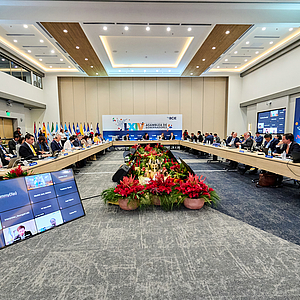CABEI and German cooperation study work agenda to support Central America

The meeting focused on seeking development initiatives to attend different needs in the Central American region.
Tegucigalpa, October 1, 2014.- The Executive President of the Central American Bank for Economic Integration (CABEI), Dr. Nick Rischbieth, and the head of the Central American, Mexican and Caribbean Division of the German Federal Ministry for Economic Cooperation and Development (BMZ, German acronym), Mr. Klaus Krämer, presided over a work meeting in order to prioritize and execute new initiatives that increase the efficiency of joint interventions to increase the region’s economic and social growth.
The German delegation included the German ambassador to Honduras, Ms. Beatrix Christina Kania, the head of Cooperation at the German Embassy in Honduras, Mr. Daniel Kempken and undersecretary of cooperation affairs at the German Embassy in Honduras, Ms. Katia Hartel.
During the meeting, CABEI Executive President Dr. Nick Rischbieth highlighted the progress that has been made in the cooperation process, which contributes significantly to CABEI’s institutional and technical strengthening in the three priority areas of joint cooperation: sustainable economic development and the promotion of Micro, Small and Medium Enterprises (MSMEs); energy efficiency and renewable energy; and natural resource supplies.
Dr. Rischbieth stated “that as a result of the cooperation, CABEI has signed an aggregate amount of more than US$300 million in loans from the German government’s KfW development bank. If this amount is added to the resources for projects funded by the European Union in the framework of its Latin American Investment Facility (LAIF), we can reach a clear understanding of the importance of the relationship for both entities.”
He likewise explained that “the strengthening of this alliance over recent years has made it possible to undertake development initiatives to attend the different demands of the Central American region. One clear example of the joint cooperation on regional programs is the recent signing of a 102 million Euro Agreement for Financial Cooperation to support the Program of Water and Sewerage in Central America II.”
The meeting is part of a series of actions conceived of as a continuous effort to coordinate the joint work between the two institutions in order to reduce poverty and achieve Central American development.





